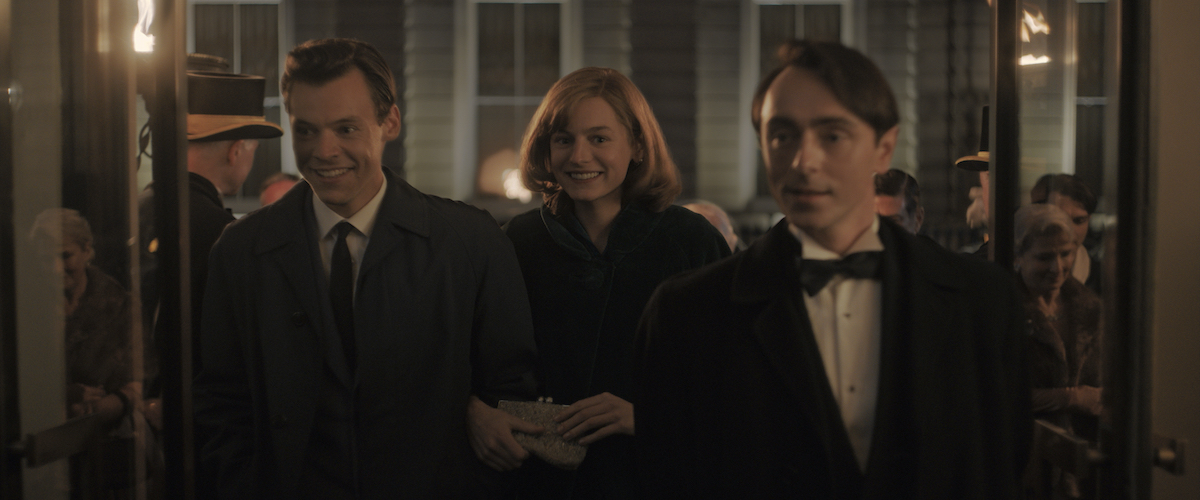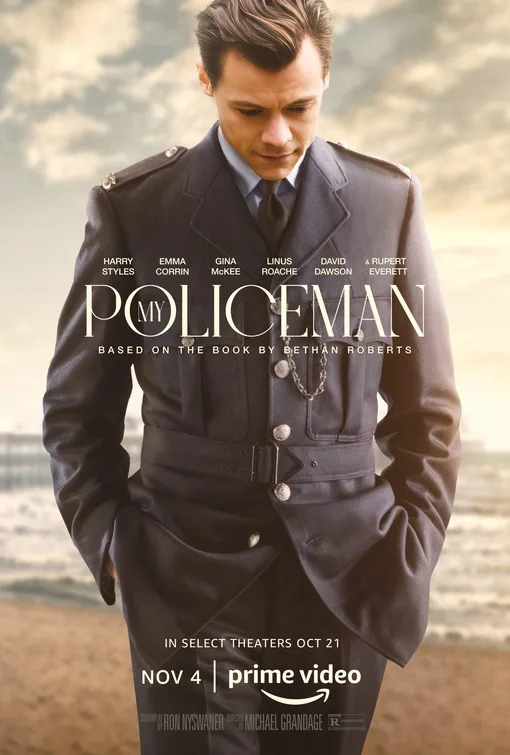Sometimes I look at Harry Styles and I feel bad for him. Not because he isn’t getting a fair shake, but because someone told him he could be a leading man without warning him about the time and work needed to become one. Hot on the heels of the world premiere of his upcoming “Don’t Worry Darling,” the Olivia Wilde-directed movie mired in controversy and less than generous reviews for his performance, Styles’ second film of 2022 is an adaptation of Bethan Roberts’ same-titled novel. Here, Styles’ inexperience as a leading man in a weepy British queer period piece is glaring. As the film’s protagonist PC Tom Burgess, he stands and speaks like a tourist awkwardly stumbling upon a movie set. His co-star, Emma Corrin, is hardly better as his stuffy lover. Corrin tussles with the least developed character of the bunch, but much like Styles, never proves themselves as a lead. How can a movie with this much youthful talent be so breathlessly boring?
Helmed by an adequate Michael Grandage, “My Policeman” begins in the present day with the older versions of these characters: Tom (Linus Roache) and Marion (Gina McKee), now retired, live in a seaside town as they go through the motions of their milquetoast marriage. Their steady march toward resignation—which Tom momentarily pauses whenever he visits the sea with their dog—is interrupted with the arrival of their old, now estranged friend Patrick (Rupert Everett). A guilt-ridden Marion volunteered to care for him after a debilitating stroke left him nearly bedridden. And while Marion is ready to bury the proverbial hatchet, Tom refuses to see the man his wife says they owe so much to because he “Taught [them] how to see art.”
The pain that Patrick caused the couple is what “My Policeman” hopes to tell us about. And yet, how it tells us, and what it thinks we hope to gain from this story, comes with little flair and even less self-awareness.
The past on a sunny beach in 1950s Britain, where Marion (Corrin) sees the dashing Tom (Styles certainly isn’t lacking in the looks department) running across the sand. He teaches her how to swim; the pair soon start dating. Humble and working-class, Tom is the total opposite of the educated, arts-focused Marion. It’s why Tom goes to such lengths to read about paintings. The two eventually meet Patrick (David Dawson), a museum curator who knows Tom from being a witness in one of his cases. The trio become inseparable. It even appears that Patrick might be attracted to Marion, and her to him. That is, until we discover that Tom and Patrick are in a closeted sexual relationship.
The messy triangle that forms from these two competing relationships is meant to suggest tension and sympathy for a hopelessly romantic woman seemingly being a victim of two men, who are also victims of the country’s homophobic laws. We come to find, however, that this trio doesn’t fit into easy boxes: Tom demands law and order; Marion is homophobic; and Patrick is somehow their friend. This conundrum would provide juicy drama if any of these actors possessed a speck of chemistry with the other. It doesn’t help that Grandage, through his blocking and coverage, and the editing by Chris Dickens (“Slumdog Millionaire”) try their best to hide Styles’ deficiencies. His physical understanding of the character lacks specificity; his line deliveries are monotone; he doesn’t project allure. There is no interiority or charm in anything he does. Even his sex scenes—where Grandage confuses bare skin and moaning for passion—are without bite.
Instead, “My Policeman” finds smoother ground in the present-day scenes with a trio of older actors who can elevate a script. Make no mistake, the prime culprit in this soporific film is a terrible screenplay that tells a gay love story through the elderly Marion, a straight cis-woman, adopting Patrick’s memories by reading his diaries. It’s also frustrating how the script’s set-up is initially intriguing, only for a twist to throw all of the built up tension and angst out without a coherent vision for what comes next. And a rushed ending doesn’t instill any further confidence. The fact that the inner lives of these characters are so underwritten you barely understand their psychology—especially with the flawed Marion, who still might be homophobic—makes them unmemorable.
“My Policeman” is surface-level queer representation lacking in visual imagination and begging for better performances. It’s the kind of glacially paced movie that sticks around for two hours and tells its viewer nothing new; a series of moving images without any sense of emotion or wonder. “My Policeman” commits the gravest of crimes—it’s soulless.
This review was filed from the Toronto International Film Festival on September 12. “My Policeman” arrives in theaters on October 21 and will be available on Prime Video on November 4.




















